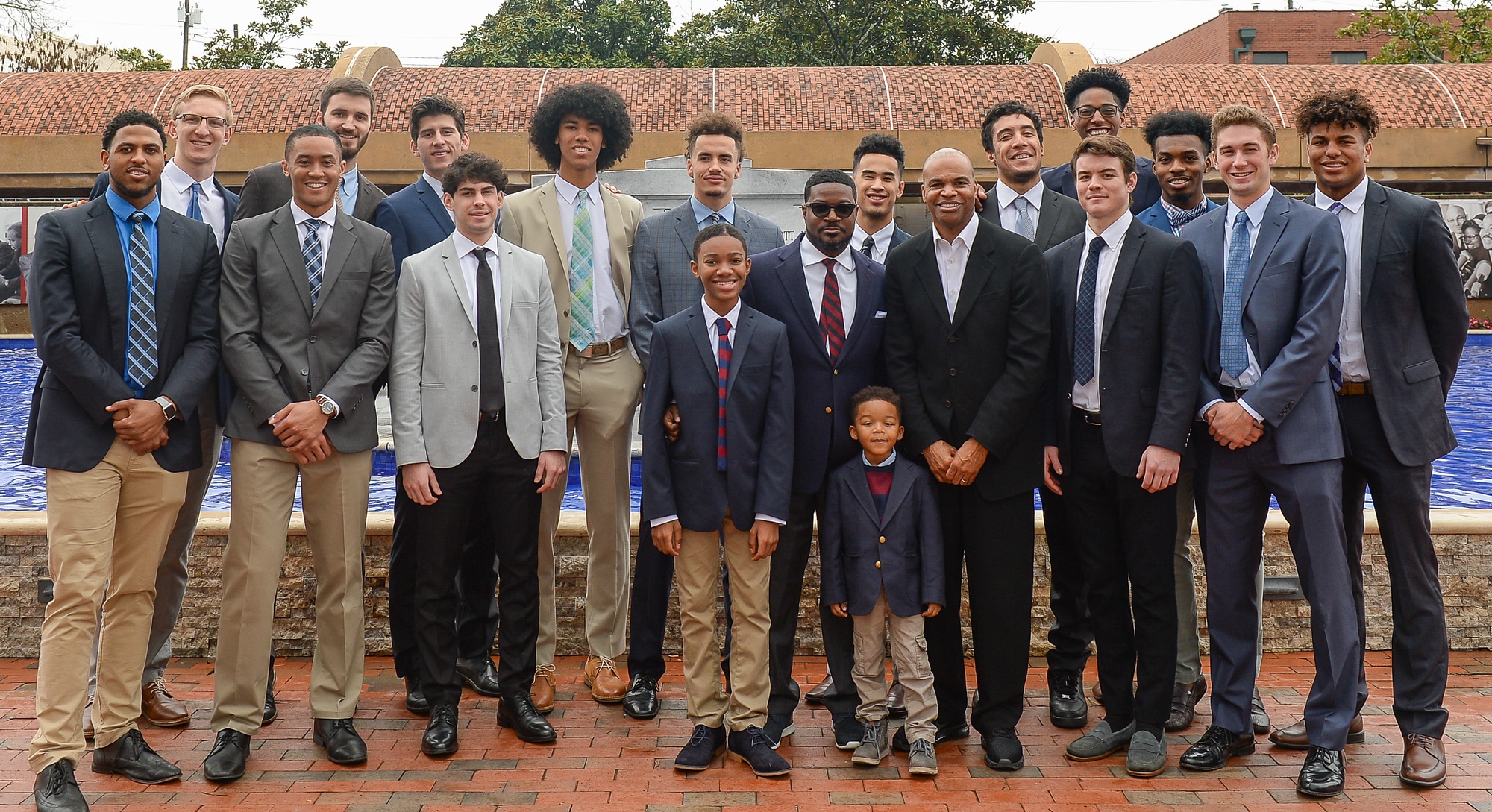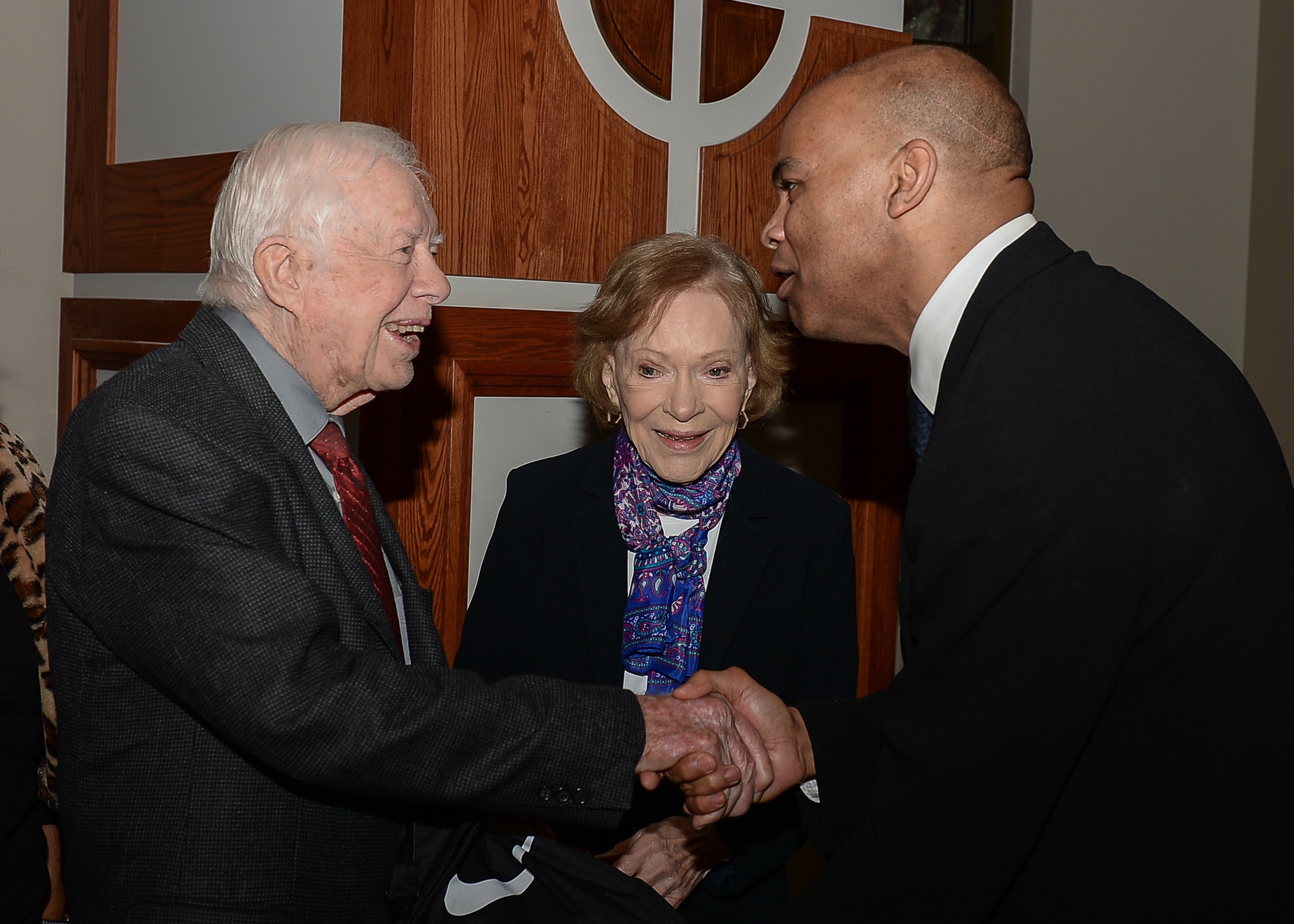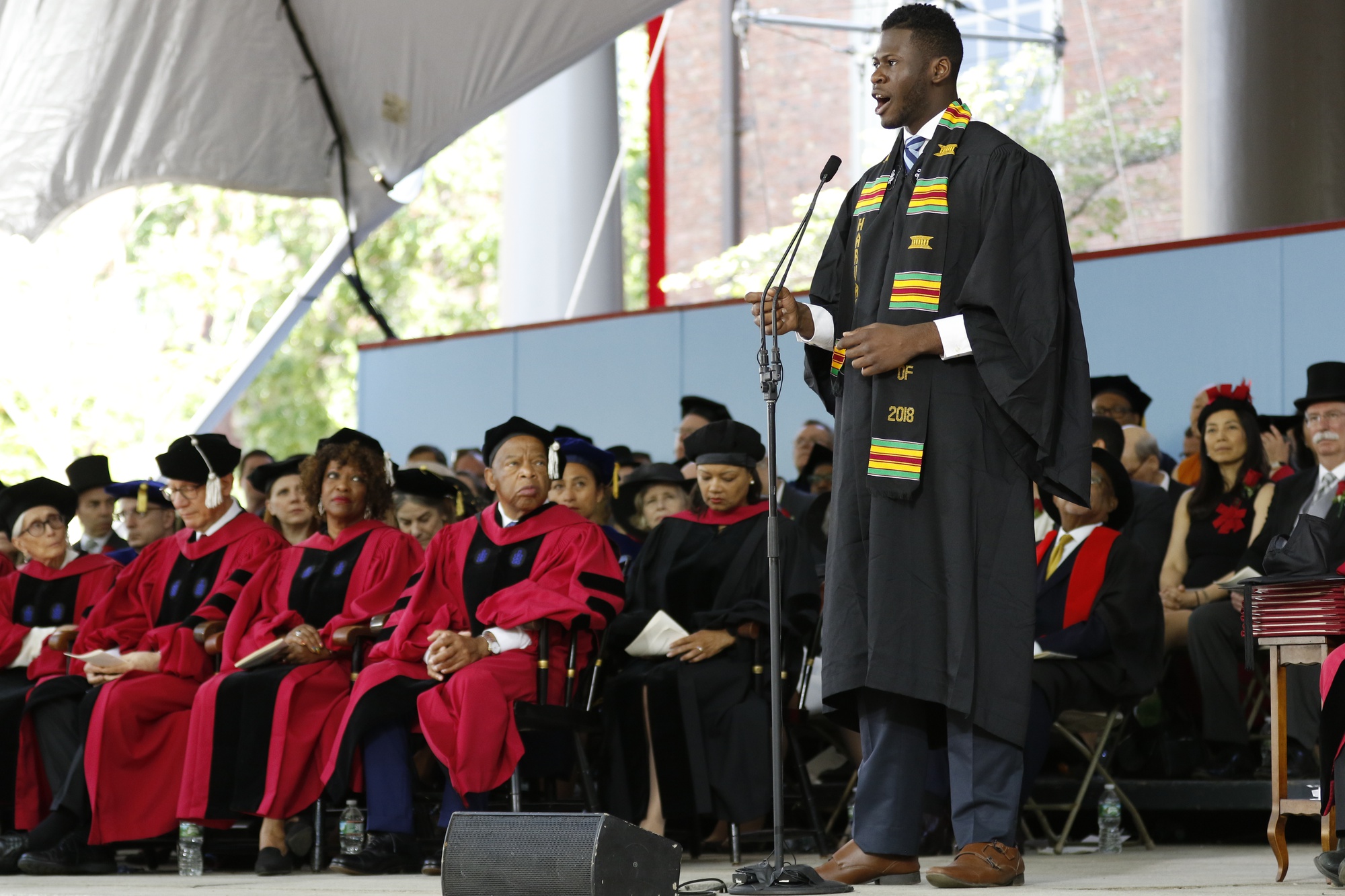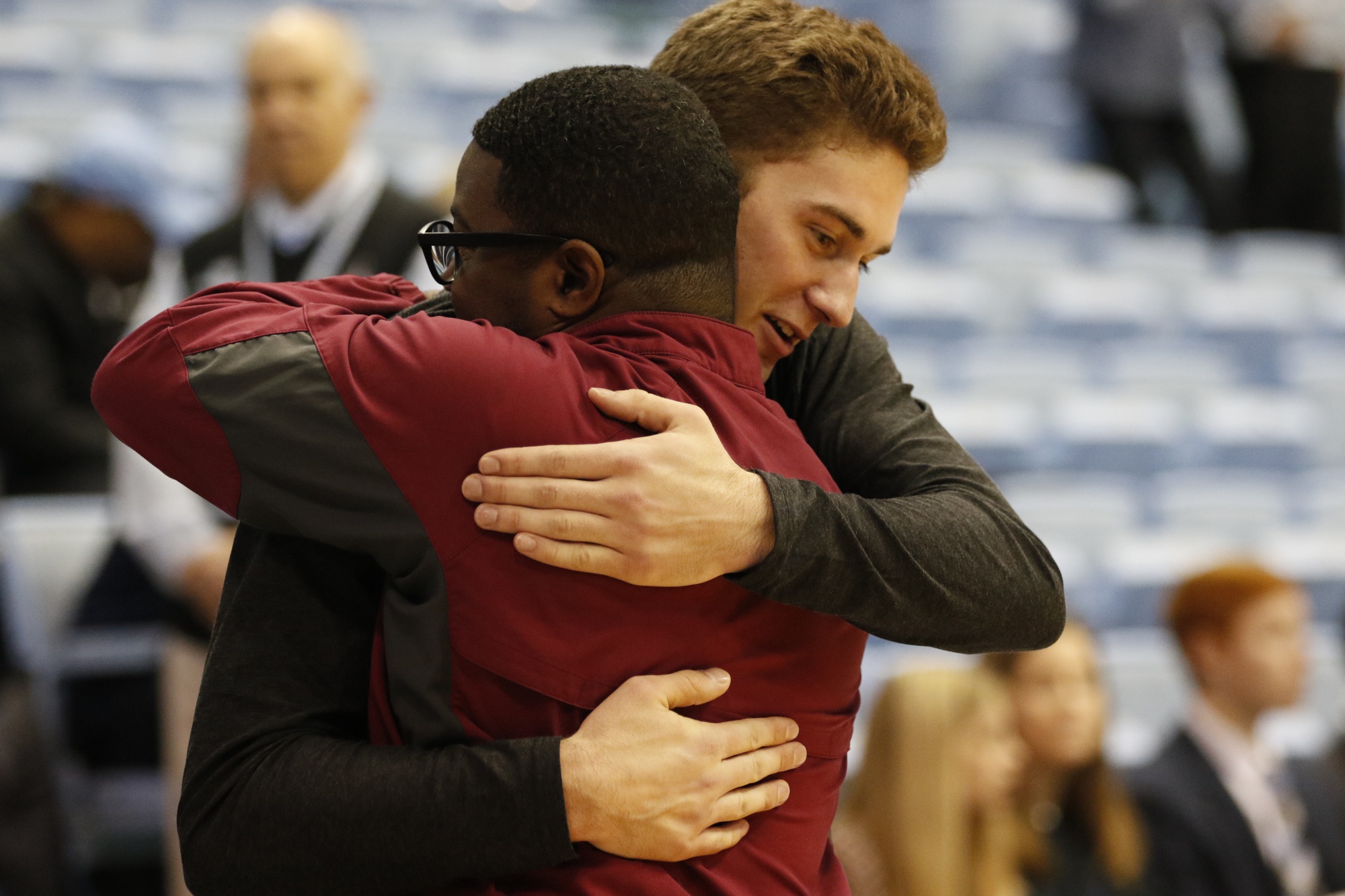
News
Harvard Quietly Resolves Anti-Palestinian Discrimination Complaint With Ed. Department

News
Following Dining Hall Crowds, Harvard College Won’t Say Whether It Tracked Wintersession Move-Ins

News
Harvard Outsources Program to Identify Descendants of Those Enslaved by University Affiliates, Lays Off Internal Staff

News
Harvard Medical School Cancels Class Session With Gazan Patients, Calling It One-Sided

News
Garber Privately Tells Faculty That Harvard Must Rethink Messaging After GOP Victory
A Voice Beyond the Court for Harvard Basketball

Over the course of a season, members of a Division I men’s basketball program expect to come in contact with imposing seven-foot bigs, feisty guards, uncompromising officials and coaches who may be even more relentless. Memories — good and bad — are formed under the bright lights of old gyms and drenched undershirts.
But take a quick scroll through Harvard Basketball’s social media or website, and it isn’t long before you find the team decked out not in their crimson jerseys or black warmups, but in suit and tie attire.
Any astute outsider trying to understand the Harvard Basketball brand would recognize a familiar pattern when scrolling through the plethora of team meet-ups of influential leaders from this past semester alone.
Whether it was ex-Secretary of Education Arne Duncan to civil rights advocate Colin Kaepernick or most recently, former U.S. President Jimmy Carter, a critical component of the student-athlete experience under the decade-plus leadership of coach Tommy Amaker is grounded upon exposure to important social advocacy issues ranging from education to racial justice.
Take the November midterm elections, for example. Alongside strategizing upcoming matchups and running through opponent scouting reports, the locker room also served as a springboard for political discussions and sharing opinions of important current events.
“I asked them, ‘So how many of you guys were able to vote?’ A majority of them raised their hands so it was great and I was really pleased to see that,” Amaker said. “We are always engaged with what’s going on around us and had discussions about politics or anything that comes up. I like to just listen sometimes and I get engaged sometimes. They ask some questions for me.”
These conversations extend beyond Lavietes Pavilion and carry across not just the Charles River — where numerous members of the team have pursued classes academically connected to social inequality or the role of NGOs in activism movements — but on road trips as well, where an active effort is taken to provide valuable opportunities for education outside of the classroom.
Over winter break, the team walked through the footsteps of Martin Luther King Jr. in his childhood home of Atlanta, visiting Ebenezer Baptist Church before paying tribute to King at his memorial. The team also dined at Paschal’s, a landmark meeting spot for civil rights strategists including King himself.
"Today was as meaningful as any day in my 12 years here at Harvard," said Amaker in a team statement. "To visit and worship at the historic Ebenezer Baptist Church - home of Dr. Martin Luther King - and to meet and visit with former President & First Lady Carter was truly an honor and a privilege. It was the experience of a lifetime for our kids."

“This is a lifetime experience, something I don’t think anyone on our team will ever forget,” junior Christian Juzang added. “We’re so grateful for that, for those opportunities. It goes back to the power of Harvard...and to have Jimmy Carter come, it's mind blowing, and we're so appreciative to have those opportunities.”
Accompanying the team as a de facto tour guide was a close mentor for the program, the Plummer Professor of Christian Morals and Pusey Minister in the Memorial Church, Reverend Jonathan Walton. A native of Atlanta and a college classmate of Rev. Raphael Warnock — the senior pastor at Ebenezer Baptist Church, Walton was tasked specifically by Amaker to organize this excursion for the team and noted how this trip conjoined well with the team’s visit to the Martin Luther King Jr. Memorial on Sunday. The Crimson will visit Howard University on Monday in its final non-conference game of the season.
“I wanted these young men to see that not only is this living history — as they are still a part of the struggle that is ongoing for human rights for all — but it’s not something that any of us have to wait on you to participate in and get engaged,” Walton said. “If we say this is somebody else’s responsibility, ... you may be missing your moment. All of us have that same opportunity if we take advantage of what Dr. King called the urgency of now.”
One former Crimson captain who has embraced this message of speaking out is Chris Egi ‘18, who delivered a speech during Commencement on searching for his black identity at Harvard while reconciling with the continued occurrences of racism and violence across America.
“And I guess that’s why I’d felt compelled to joined the protesters that day — even if I hadn’t ever considered myself an activist,” Egi described in a follow-up piece for The Players’ Tribune, in which he reflected on spontaneously joining a Harvard Square protest on institutional violence. “It was because Ferguson happened the same month I started college — the same time Michael Brown would’ve started college. And because I was 18 years old, the same age as Michael Brown.”

Egi is just one example of a Crimson student-athlete embracing a more outspoken position on issues of equality and justice in the country. During last year’s national discussions on athlete activism, members of the team including current captain Corey Johnson spoke on the importance of unity and example-setting in the face of political discord.
“It is obviously a big statement and brings a lot of attention to the basketball community and around the country,” said Johnson in referencing Fox News host Laura Ingraham’s “shut up and dribble” comments, “But we are a family here and support everybody no matter what their beliefs are and that’s what we reiterate and that’s what we want to come off as a team. It’s tough to see what’s going on in the country but we just have to stick to us and continue to be positive role models here and to the rest of the world.”
For Rev. Walton — who is co-teaching a class with Professor Brandon Terry on “the political and religious philosophy of Martin Luther King Jr.,” this upcoming semester entitled “Conscientious Citizenship” — those on the team have a distinct responsibility on campus beyond simply winning championships.

“These boys are called to be leaders on and off the court, and people look up to them literally and metaphorically,” Walton noted. “It is because of this that they have a responsibility to use their platform, prominence, and privileged position in the world to call attention to the plight and suffering of others.”
And in speaking of the team’s audience at Lavietes Pavilion and beyond, coach Amaker pointed out that the team’s popularity is itself a representation of the strides made in diversity on campus — as noted by former President and longtime basketball supporter Drew Faust.
“I've love how she talks about how diverse our community has become around our basketball games,” Amaker said. “You can just look and see diversity and you know, not only in terms of race, but also with students, deans, faculty, professors, it's just a whole host of people. So pretty neat to see how it's touched a lot of people in our community.”
As this program has demonstrated, basketball can serve as a important bridge in connecting those from different backgrounds and a spotlight for bringing to the forefront important societal issues. Beyond the wins and losses, coach Amaker’s tenure at Harvard will be defined by the standards he has established off-the-court, in those oversized suit-and-ties.
“Tommy knows everybody and rather than build relationships to strengthen his own prominence or reputation, he uses his relationships to encourage the work of others, to put up in front of his young men as an example of what is possible for them,” Rev. Walton said. “Life is not just about earning a living, but living a life that is worth living.”
— Staff writer Henry Zhu can be reached at henry.zhu@thecrimson.com. Follow him on Twitter @Zhuhen88.
Want to keep up with breaking news? Subscribe to our email newsletter.
